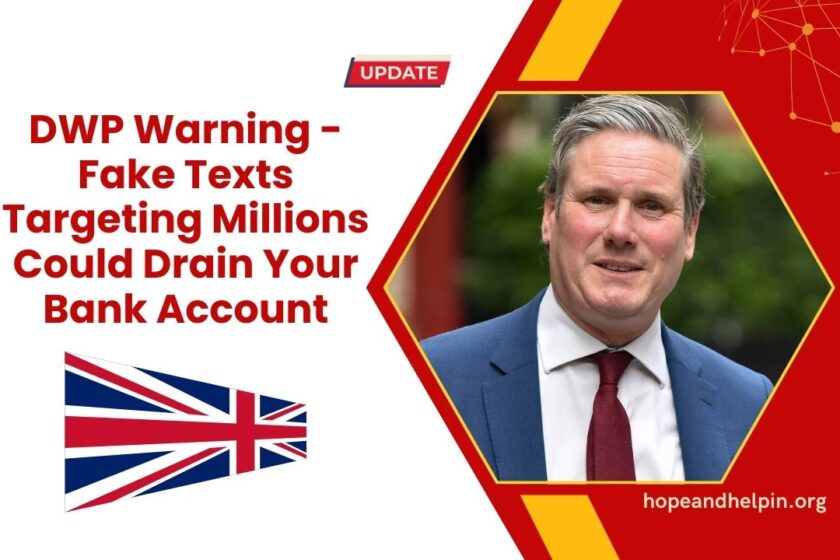The Department for Work and Pensions (DWP) has issued an urgent warning to millions of UK citizens about an alarming rise in fraudulent text messages.
These fake texts are designed to trick people into clicking links, sharing personal information, and even bank details, potentially leading to drained accounts and stolen identities.
The warning comes after a surge in reported cases of people receiving texts claiming to be from the DWP. Many of these messages mention benefits such as the Winter Fuel Payment or Heating Allowance, attempting to scare recipients into acting quickly.
What Are These Fake DWP Texts?
Fraudsters are sending text messages that appear genuine, sometimes even showing up in the same thread as legitimate government messages due to number spoofing.
These messages typically claim there is an issue with your benefit application or that you need to apply urgently to avoid losing financial support.
For example, one fake text circulating states that the recipient must apply for a £300 Winter Heating Allowance by a specific date or risk being ineligible. It often contains a suspicious link that leads to a fake government website designed to steal your information.
Key Features of a Scam Text
Here’s a breakdown of the most common signs to watch for:
| Feature | Scam Example |
|---|---|
| Urgent Deadline | “Apply by August 12, 2025, or lose eligibility for your £300 benefit.” |
| Spoofed Sender ID | Appears as if sent from “DWP” or merges with genuine message threads. |
| Financial Promise | Mentions payments between £200–£300 for Winter Fuel or Heating Allowances. |
| Suspicious Link | Directs you to a fake site resembling gov.uk to steal personal details. |
| Request for Information | Asks for your bank account, National Insurance number, or card details. |
| Odd Details | Dates that don’t match up, poor grammar, or threats of losing benefits quickly. |
How These Scams Trick You
Fraudsters rely on urgency and fear to make people act without thinking. Messages may say your account is compromised, your benefit application is incomplete, or that you’re about to lose out on money if you don’t respond.
They may even use spoofing technology to make the number look genuine. For example, a text from scammers could appear in the same thread as previous official messages, making it more convincing.
What the DWP Says
The DWP has confirmed that it never sends texts or emails requesting bank details for benefits such as the Winter Fuel Payment. Legitimate payments are usually made automatically if you are eligible, and official communication about benefits arrives by letter only, not text messages.
This means that any digital message asking for your details should be treated as a red flag and ignored immediately.
How to Stay Protected
To avoid becoming a victim of these scams, follow these key safety tips:
- Never click on suspicious links sent via text or email.
- Do not share personal or financial information through texts.
- Block and report the sender if you receive a suspicious message.
- Check official government websites directly rather than using links in messages.
- Report scam texts by forwarding them to 7726 (a free reporting service).
- Speak to vulnerable friends or family who may not recognize scams easily, and warn them about what to look for.
Why These Scams Are Rising
The number of scam attempts has grown sharply, especially around benefit deadlines and payment announcements. Fraudsters know that millions rely on DWP payments, making these scams highly effective.
With advances in technology, scams are becoming more sophisticated, using AI tools and realistic fake websites that look like official portals. This makes it even more important to remain cautious.
Real-World Impact
Text message scams have already cost UK residents millions of pounds in stolen funds. Victims often find that scammers drain their accounts within minutes once they’ve shared banking details. Beyond financial loss, victims may also face emotional stress and difficulties reclaiming stolen money.
The rise in fake DWP texts is a serious concern that could affect millions. These scams use urgency, fake deadlines, and convincing designs to trick people into giving away personal data.
Always remember: the DWP will never ask for your bank details via text or email, and legitimate payments are processed automatically.
By staying alert, verifying information through official government channels, and spreading awareness, you can protect yourself and others from falling victim to this dangerous fraud.
FAQs
Does the DWP ever text people for bank details?
No, the DWP never asks for bank or personal details by text or email. Genuine communication is done through official letters.
What should I do if I get a suspicious DWP text?
Do not click any links or reply. Report the scam by forwarding the text to 7726, block the number, and delete the message.
How can I tell if a DWP message is real or fake?
A real message will never ask for sensitive data. Red flags include urgent deadlines, unfamiliar links, and requests for personal or financial information.

